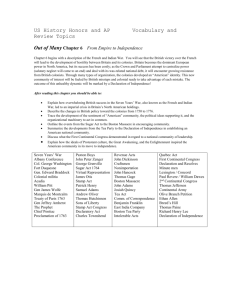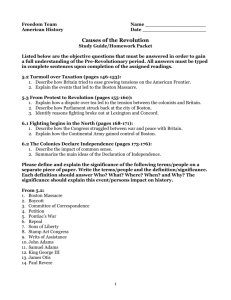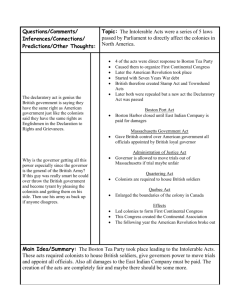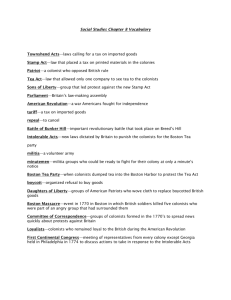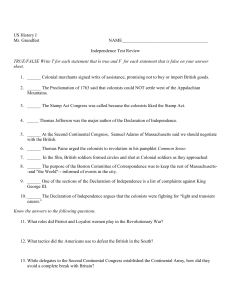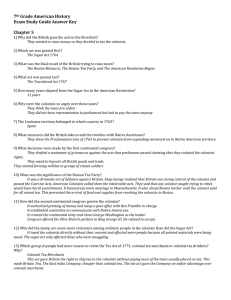chapter 5 - Cengage Learning
advertisement
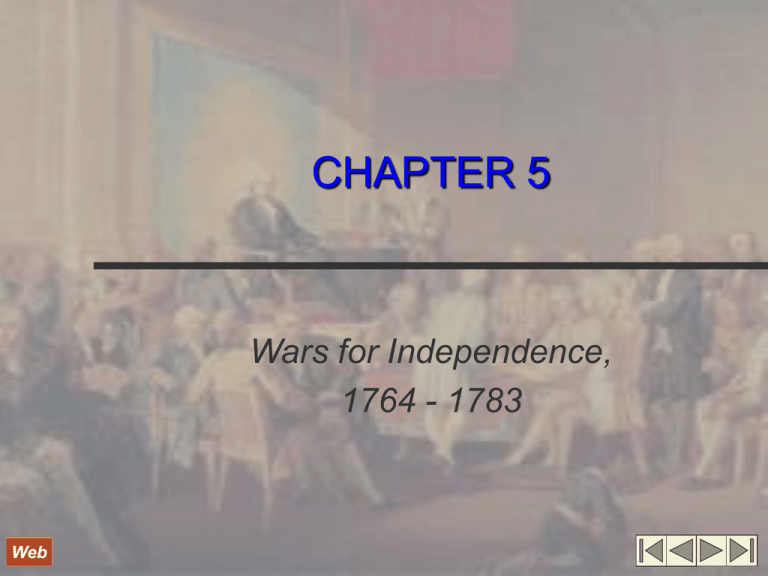
CHAPTER 5 Wars for Independence, 1764 - 1783 Web Realignments in the Spanish Borderlands Britain gains Florida after Seven Years’ War Spain retains Louisiana and port city of New Orleans General Alexander O’Reilly Spanish forts in Southwest grow in number, Spain faces more threats from Apaches and Comanches The British Colonies Resist Imperial Reform Sugar Act attempts to end smuggling by lowering tariffs Writs of assistance Currency Act forbids colonists from producing paper money Stamp Act angers colonists and leads to formation of Sons of Liberty Patrick Henry Colonists in lower South are unhappy with both Parliament and their own colonial elite Imperial Reform (cont.’d) Townshend Revenue Act worsens feelings Raises revenue without representation Results in Letters from a Farmer in Pennsylvania, uniting colonists Result is series of nonimportation agreements Boston becomes center of conflict Boston Massacre John Adams Burning of Gaspée and formation of Committees of Correspondence indicate colonial unrest Boston Tea Party Boston Tea Party of 1773 demonstrates colonial defiance Tea Act designed to protect British East India Company by removing duties on its tea Bostonians dump tea to protest manipulation Britain responds with Coercive Acts, designed to get Boston under control Quebec Act Coercive Acts First Continental Congress meets in Philadelphia in fall of 1774 Resistance Becomes a War for Independence First shots fired in April 1775, at Lexington and Concord British losses 73 dead, 200 wounded Boston losses 49 dead, 43 wounded Green Mountain Boys capture Fort Ticonderoga Second Continental Congress meets in May, selecting George Washington to command the new Continental Army Battle of Bunker Hill leads George III to declare colonies in rebellion Olive Branch Petition Battles in Eastern Massachusetts ©2004 Wadsworth, a division of Thomson Learning, Inc. Thomson Learning™ is a trademark used herein under license. Taking Sides Colonists find themselves having to choose sides Loyalists usually wealthy African American support ill received by Whigs Patriots resort to conscription Women support cause in many ways Continental Congress ratifies Declaration of Independence in July 4, 1776 Thomas Jefferson In mid-July, adopted Articles of Confederation Confederation of sovereign states Congress conducted foreign affairs Congress had no power to tax or raise troops The War in the North, 1776-1779 Britain invades New York Battle of Brooklyn Heights British dominate war Continentals use guerilla tactics British occupy Philadelphia during winter of 1777-1778 Washington turns troops into effective army at Valley Forge Baron von Steuben Battle of Saratoga brings French into war on side of colonists Patriots continue to suffer from economic problems Northern Campaigns, 1776-1778 ©2004 Wadsworth, a division of Thomson Learning, Inc. Thomson Learning™ is a trademark used herein under license. The War Moves West and South Fighting intensifies on frontier Natives attacked on entire frontier Fort Vincennes Iroquois and Delaware ally with British Continental forces devastated Native Americans Britain invades South, seeking Loyalist support there, but plan backfires British force to retreat North Lord Cornwallis surrenders to Washington at Yorktown, October 1781 Southern Campaigns, 1778-1781 ©2004 Wadsworth, a division of Thomson Learning, Inc. Thomson Learning™ is a trademark used herein under license. Virginia and the Yorktown Campaign Peace Settlement Treaty of Paris (1782) ends hostilities but leaves problems Web New nation extends from Atlantic coast to Mississippi River, and from Canada to 31st parallel Britain agrees to remove troops promptly, then fails to do so Loyalists are assured of protection, but many face discrimination and leave country 20,000 slaves freed by British left with them, over protest of Americans War of Independence was a success, but left many unresolved issues Discussion Questions Why were Americans unwilling to support the various “acts” put forth by Britain to raise revenue from the colonies? What were the causes of the American Revolution? What advantages and disadvantages did each side have? What role did natives and African Americans play in the Revolution? How did the Revolution help establish a national identity for the United States?



